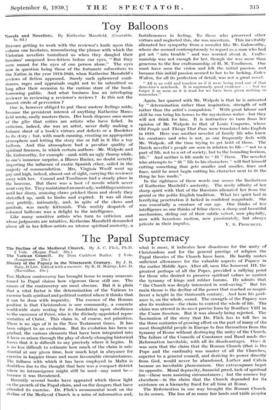Toy Balloons
BEFORE getting to work with the reviewer's knife upon this volume one hesitates, remembering the phrase with which the Victorian novelists tantalized us when they dangled their heroines' unopened love-letters before our eyes, "But they were meant for the eyes of one person alone." The eyes now in question being those of the fortunate subscribers to the Nation in the year 1919-1920, when Katherine Mansfield's reviews of fiction appeared. Surely such ephemeral confi- dences, rages and appraisals ought not to be submitted so long after their occasion to the curious stare of the book- borrowing public. And what business has an interloping reviewer in reviewing a reviewer's reviews ? Is this not the inmost circle of perversion ?
One is, however obliged to put these austere feelings aside, because the persistent interest of anything Katherine Mans- field wrote, easily masters them. Her book disposes once more of the gibe that critics are artists who have failed. In criticism, indeed, she was an artist, never dully making a balance sheet of a book's virtues and defects or a Baedeker to its stary ; but, with much cunning, creating an appropriate atmosphere and letting the story rise or fall in it like a toy balloon. And this atmosphere had a peculiar quality of spiritual fineness, in which certain authors—Mr. Walpole and Mr. Galsworthy, for example—sank with an ugly thump while, to one's immense surprise, a Blasco Ibafiez, no doubt secretly importing the influence of exotic Spanish ether, sailed in the majesty of commendation. Mrs. Virginia Woolf went up gay and high, indeed, almost out of sight, carrying the reviewer away with her. Conrad and Tomlinson had a steady place in the heavens. But there was a host of novels which never went very far. They maintained an unsteady, wobbling existence until her sharp, amusing claws pricked them and slowly they shrivelled up, sank to limbo and expired. It was all done very prettily, intimately, and, in spite of the claws and gambols, was rarely kittenish. This weekly despatch of coloured balloons was a delight to the intelligence.
Like many sensitive artists who turn to criticism and whose judgments are intuitive, Ka therine Mansfield demanded above all in her fellow-artists an intense spiritual austerity, a
fastidiousness in feeling. To those who preserved other virtues and neglected this, she was uncertain. This inevitably alienated her sympathy from a moralist like Mr. Galsworthy, whom she seemed contemptuously to regard as a man who haul got art " into trouble" and was worried about it. Crafts- manship was not enough for her, though she was more than generous to the fine craftsmanship of II. M. Tomlinson. One must have seen the vision and felt the initial passion, and because this initial passion seemed to her to be lacking, Esther Wafers, for all its perfection of detail, was not a great novel. , "Allis as cold and toneless as if it were being read out of that detective's notebook. It is supremely good evidence . . . but we forget it as soon as it is read for we have been given nothing to remember."
Again, her quarrel with Mr. Walpole is that he is animated by "determination rather than inspiration, strength of will rather than the artist's compulsion." With great labour and skill he can bring his horses to the mysterious water—but they will not drink for him. It is instructive to turn from her opinion of Mr. Walpole to that of Louis Couperus, whose Old People and Things That Pass were translated into English in 1919. Here was another novelist of family life who knew his creatures and who is not, as one frequently feels with Mr. Walpole, all the time trying to get hold of them. The Dutch novelist's people are seen in relation to life—" not to a part of life, not to a set of society, but to the bounding horizon, life." And neither is life made to " fit" theist The novelist who attempts to " fit" life to Isis characters will find himself cutting something that gets smaller and smaller, finer and finer, until he must begin cutting his character next to fit the thing he has made."
In the rightness of these words one senses the limitations of Katherine Manfield's austerity. The ready allinity of her sharp spirit with that of the Russians alienated her from the genial or the polite English tradition. What her spirit had in terrifying penetration it lacked in confident magnitude. She was essentially a creature of our age. One thinks of her intelligence as one thinks of feline claws, a sharp and beautiful mechanism, sliding out of their subtle velvet, now playfully, now with luxurious motion, now passionately, but always






























 Previous page
Previous page